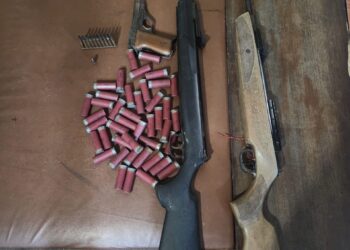By Oscar Nkala
The Nigerian Army's Joint Taskforce (JTF) on illegal oil bunkering has said it arrested 1 945 suspects and seized 18 vessels for oil bunkering and illegal entry into the country's territorial waters in 2012 under Operation Pulo Shield, a maritime security operation aimed at safeguarding offshore oil installations and combating illegal activities on the country's major rivers and creeks.
JTF commander Major General Johnson Ochoga told local media that the taskforce lost nine soldiers during military action against bandits and oil thieves in the waterways and creeks of the restive Niger Delta. Ochoga said the army is alarmed at the high number of foreigners engaged in piracy, oil bunkering, illegal fishing, arms smuggling and other maritime crimes in Nigeria's territorial waters.
He said more than 60 foreigners – 21 from Ghana, 10 from India, 15 from Russia, some Lebanese and a few from Asian and European countries – were arrested by the JTF within Nigeria's territorial waters while others were arrested by the Nigerian Navy (NN) engaged in anti-piracy missions in the international waters of the volatile Gulf of Guinea.
General Ochoga said the JTF conducted 7 585 illegal bunkering patrols along the creeks of the Niger Delta in 2012 and destroyed 133 barges, 1 215 Cotonou boats, 187 tanker trucks, 178 illegal fuel dumps and five surface oil tanks. He said the army also destroyed 36 504 drums of illegally refined oil products, 638 illegal pumping machines and 326 outboard engines used to power boats used by oil bunkerers and pirates. A total of 4 349 illegal refineries were destroyed.
"The arrest of 21 Ghanaians and their five Nigerian collaborators, as well as the destruction of two vessels containing 1 300 tonnes of crude oil, is an indicator that there is a noticeable involvement of foreigners in illegal bunkering in the region. Another instance is the recent arrest of 10 suspects of Indian nationality and four Nigerians on board MT Ashkay. This has brought to the fore, the need to monitor foreigners more closely in the region," Gen Ochoga said.
The JTF's ongoing crackdown against oil bunkering made major gains last weekend when the force burned down 35 illegal oil refineries and destroyed 18 boats in the coastal communities of Ondo, Eda and Delta states. In the same week, soldiers from the JTF's 19 Battalion intercepted 1.6 million litres of stolen crude oil destined for illegal oil refineries located in the creeks of the Dababilebu, Akitogbo, Adiloseimo, Obontonu and Akina-Zion communities.
However, the JTF crackdown comes at a time of heightened international security concerns that Nigeria has already become a new center for maritime piracy as the number of attacks increase steadily despite the government's impressive naval assets. The International Maritime Bureau recorded 27 pirate attacks off the coast of Nigeria in 2012, a marked increase from the 10 incidents recorded in 2011.
However, the Nigerian Maritime Administration and Safety Agency (NIMASA) gave higher figures saying it recorded 56 piracy attacks in Nigerian territorial waters in 2010, which increased to 119 incidents in 2011. However, the authority said the incidents dropped to 69 in 2012 due to the operations of the Nigerian Navy off the coast of Nigeria and the coast of neighbouring Benin. In December 2012 alone, gunmen attacked three commercial vessels within six days, ransacking the ships and taking a total of nine crew members hostage.
Presenting a paper entitled 'Measures to Check Piracy and Other Illegal Activities on Nigerian Waters' in Lagos last week, the Nigerian Navy's Command Intelligence Officer Usman Bugaje said Nigeria should lead the West African coastal states neighbouring the Gulf of Guinea in developing a robust regional maritime security strategy through capacity building, equipment sharing, joint training exercises and intelligence fusion.
He said this will help the regional naval forces in conducting effective marine patrols and maintaining surveillance over territorial waters. Commander Bugaje said the navy can only win the war against piracy and other maritime crimes if the NIMASA enforces rules requiring the installation of marine identification systems to ease the identification and recording of all ships entering and transiting through Nigerian waters.
"Nigerian waters are fast becoming dangerous in terms of piracy. Greater attention must be paid to boosting the capacity of the Nigerian Navy through the acquisition of more functional ships, boats, offshore patrol vessels (OPV), helicopters and back-up facilities for combating piracy and other maritime crimes,” he said.
















Discussion about this post